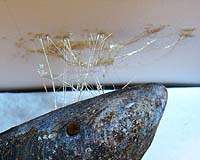 |
Durham, England (UPI) Jun 9, 2009 British engineers say the secret of sandcastle construction could help revive an ancient building technique that uses rammed earth. Durham University researchers said they conducted a study into the strength of rammed earth, which is growing in popularity as a sustainable building method. They determined that as a sandcastle needs a little water to stand up, the strength of rammed earth was heavily dependent on its water content. Rammed earth is a manufactured material made of sand, gravel and clay that is moistened and then compacted between forms to build walls. The researchers led by Charles Augarde of Durham University's School of Engineering said their findings could have implications for the future design of buildings using rammed earth. "We know that rammed earth can stand the test of time, but the source of its strength has not been understood properly to date," Augarde said. "Without this understanding we cannot effectively conserve old rammed earth or make economic designs for new build. Our initial tests point to its main source of strength being linked to its water content." The research appears in the journal Geotechnique. Share This Article With Planet Earth
Related Links Space Technology News - Applications and Research
 Metal In The Mussel That Gives Mussels Their Muscle Power
Metal In The Mussel That Gives Mussels Their Muscle PowerSanta Barbara CA (SPX) Apr 14, 2009 Researchers in California are reporting for the first time that metals are key ingredients that give the coatings of anchoring byssal threads of marine mussels their amazing durability. The study could lead to the design of next-generation coatings for medical and industrial applications, including surgical coatings that protect underlying tissues from abrasion and also life-threatening ba ... read more |
|
| The content herein, unless otherwise known to be public domain, are Copyright 1995-2009 - SpaceDaily. AFP and UPI Wire Stories are copyright Agence France-Presse and United Press International. ESA Portal Reports are copyright European Space Agency. All NASA sourced material is public domain. Additional copyrights may apply in whole or part to other bona fide parties. Advertising does not imply endorsement,agreement or approval of any opinions, statements or information provided by SpaceDaily on any Web page published or hosted by SpaceDaily. Privacy Statement |